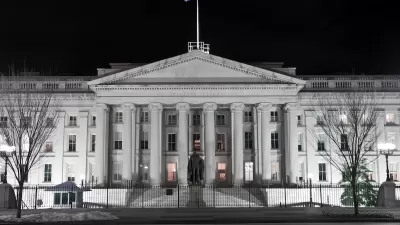Food trucks are becoming an increasingly visible part of streetlife in many cities, but few have figured out how to deal with them from a policy standpoint.
This piece from The City Fix looks at the trend in Washington D.C., and how the city's government is reacting.
"Planners are thrilled at the food cart craze too, as carts can enliven the urban environment and revive dead spaces, such as parking lots. In times of recession, street food seems even more important, providing affordable eating options to citizens and allowing culinary entrepreneurs to open businesses with lower start-up costs.
However, this trend has developed in spite of the challenges facing mobile food vendors. Food carts don't seem to fit into cities' normal regulatory structures – they're mobile and can cross jurisdictional lines, but they also need to park, and are often not welcome in public or private spaces. They sell food and need to pass health inspections, but they're not traditional brick-and-mortar restaurants. They offer a service to customers but not necessarily amenities like restrooms."
FULL STORY: Food Trucks: Tasty, But Tricky

Alabama: Trump Terminates Settlements for Black Communities Harmed By Raw Sewage
Trump deemed the landmark civil rights agreement “illegal DEI and environmental justice policy.”

Study: Maui’s Plan to Convert Vacation Rentals to Long-Term Housing Could Cause Nearly $1 Billion Economic Loss
The plan would reduce visitor accommodation by 25% resulting in 1,900 jobs lost.

Planetizen Federal Action Tracker
A weekly monitor of how Trump’s orders and actions are impacting planners and planning in America.

Wind Energy on the Rise Despite Federal Policy Reversal
The Trump administration is revoking federal support for renewable energy, but demand for new projects continues unabated.

Passengers Flock to Caltrain After Electrification
The new electric trains are running faster and more reliably, leading to strong ridership growth on the Bay Area rail system.

Texas Churches Rally Behind ‘Yes in God’s Back Yard’ Legislation
Religious leaders want the state to reduce zoning regulations to streamline leasing church-owned land to housing developers.
Urban Design for Planners 1: Software Tools
This six-course series explores essential urban design concepts using open source software and equips planners with the tools they need to participate fully in the urban design process.
Planning for Universal Design
Learn the tools for implementing Universal Design in planning regulations.
Caltrans
Smith Gee Studio
Institute for Housing and Urban Development Studies (IHS)
City of Grandview
Harvard GSD Executive Education
Toledo-Lucas County Plan Commissions
Salt Lake City
NYU Wagner Graduate School of Public Service



























